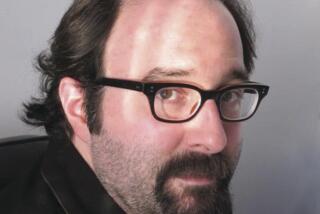Flashback to 1968 and Hollywood’s reel radicals
THE more things change, the more they stay the same. And as change goes, 1968 was a watershed year in every part of American life, movies very much included. At that year’s Academy Awards, the five films vying for best picture of 1967 were a postcard of Hollywood’s past and future: “Doctor Dolittle,” “Guess Who’s Coming to Dinner,” “Bonnie and Clyde,” “The Graduate” and, the winner, “In the Heat of the Night.” In his new book, “Pictures at a Revolution: Five Movies and the Birth of the New Hollywood,” Mark Harris tracks their evolution during the last days of the studio system.
“These five films represent a vision of Hollywood that was splitting in two,” says Harris, who is appearing tonight at Book Soup in West Hollywood. “ ‘Bonnie and Clyde’ and ‘The Graduate’ were real game changers.” The former “broke barriers in how violence was depicted,” the latter “made similar advances on the sexual front and had an ironic perspective and bead on the generation rift that hadn’t been seen in American movies.”
“Heat” and “Dinner” were message films -- attempts to grapple with race, which had become the hot-button issue -- with varying degrees of success. And then there was “Doctor Dolittle,” “as rusty and arthritic a representative of older Hollywood as you can imagine,” says Harris, whose biggest revelation during research was that this complete disaster best represents the way movies are made now.
“Hollywood still makes the same mistakes,” Harris says. “They pick a release date when they don’t have a script, bend over backward to the ego of a difficult star [“Dolittle’s” Rex Harrison], think they can spend their way out of trouble, count on a marketing campaign to paper over all the problems. And studio thinking has only gotten more calcified in investing everything in big franchise movies.”
Harris, whose book details the 40th Oscar race, also sees parallels with Sunday night’s 80th -- specifically, in some risky choices. “ ‘No Country for Old Men’ and ‘There Will Be Blood’ don’t make it easy for their audience, in the same way ‘Bonnie and Clyde’ and ‘The Graduate’ didn’t. The academy gets branded for being old-fashioned, but there are voters, then and now, who are willing to look forward. There are decades when you can say, ‘Oh, the academy only likes tear-jerkers or epics or whatever’; 1967 was not one of those moments, and it’s not right now.”
Harris points out that in 1968 the darkest film, “Bonnie and Clyde,” was the favorite going in. “Right now people are saying ‘No Country’ is the favorite. If it loses to ‘Michael Clayton’ or ‘Atonement,’ then that’s another parallel.”
One dramatic difference between then and now: None of this year’s nominees are popular hits.
“ ‘The Graduate’ is among the highest-grossing movies of all time,” says Harris. But, then, it also had a two-year theatrical run. And “Bonnie and Clyde” only became a financial success after spending a year in theaters. “I question whether a movie like that would ever have a chance of being a hit now -- except on DVD.”
--
-- MaryKaye.S[email protected]
--
MARK HARRIS, ‘PICTURES AT A REVOLUTION’
WHERE: Book Soup, 8818 Sunset Blvd., West Hollywood
WHEN: 7 p.m. today
PRICE: Free
INFO: (310) 659-3110, www.booksoup.com
More to Read
Sign up for our Book Club newsletter
Get the latest news, events and more from the Los Angeles Times Book Club, and help us get L.A. reading and talking.
You may occasionally receive promotional content from the Los Angeles Times.







